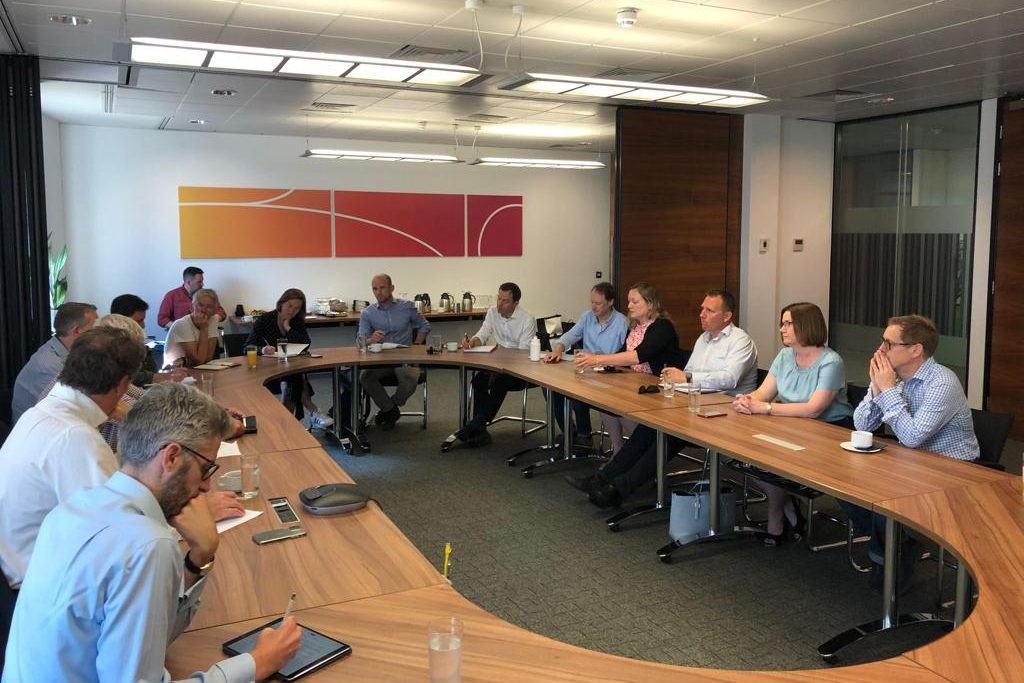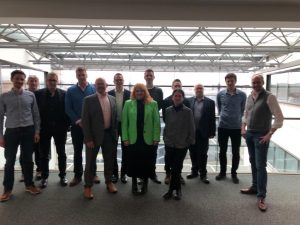
Cooperation is key to creating a city fit for the future
Bristol has long been considered one of the best cities in the UK to live, work and play.
Thanks to its laidback approach, green spaces and mostly appealing architecture the capital of the West Country is the kind of place where people like to put down roots. Bristol is much smaller than some of the other core cities, but where it does manage to hold its own is when it comes to attracting and keeping the very best talent who then go on to launch creative, innovative and generally exciting businesses and enterprises.
TheBusinessDesk.com organised a round table, with the support and sponsorship of Thrings, Hydrock and Bristol and Bath Regional Capital, which was attended by property professionals, developers and consultants.
 The discussion looked at what levers can be used to make our cities work in a way that best suits the needs of the people who live and work in them. More importantly the discussion focussed on what can be done to improve the current situation and ensure we are creating the kind of cities that are properly designed and fit for the future.
Judging from the course of the debate there is a sense of frustration when it comes to leadership at a local level and there is also a feeling that the current planning system is a hindrance rather than a help in terms of encouraging innovative and imaginative development.
But the focus was very much on the future rather than the past and if there was one theme that emerged from the discussion it was around vision and voice.
For any venture, city or enterprise to flourish there needs to be not only a clear vision but also a clear voice driving the project forward.
The discussion looked at what levers can be used to make our cities work in a way that best suits the needs of the people who live and work in them. More importantly the discussion focussed on what can be done to improve the current situation and ensure we are creating the kind of cities that are properly designed and fit for the future.
Judging from the course of the debate there is a sense of frustration when it comes to leadership at a local level and there is also a feeling that the current planning system is a hindrance rather than a help in terms of encouraging innovative and imaginative development.
But the focus was very much on the future rather than the past and if there was one theme that emerged from the discussion it was around vision and voice.
For any venture, city or enterprise to flourish there needs to be not only a clear vision but also a clear voice driving the project forward.
 Phil Morton, who runs his own property business Morton Property Consultants, believes Bristol has its own unique charm and character.
He says: “Bristol has always been a work-to-live city and a lot of other cities have been a little bit envious of us. From an occupiers point of view they like the reputation the city has.
“We have got the culture right but one of the key issues for the city over the next five to ten years is to get the station and the rail network right.
“Driving into the city is quite difficult so most occupiers who come into the city want to be as close to the train station as possible.”
Nigel Dyke is a director at Alec French Architects and has worked in the region for many years.
“I think it is fair to say that Bristol has been a successful city in spite of itself,” he says.
“Bristol is a a bottom up city and things tend to happen at a lower level. It is an incredibly dynamic city and lots of things are going on here.
“There are lots of entrepreneurs and creativity, but things tend to happen despite the city itself and its leadership. There is a long history of things that might have been and there are a lot of challenges for the city in the future. The key is bringing together everything that is happening across the city.”
Phil Morton, who runs his own property business Morton Property Consultants, believes Bristol has its own unique charm and character.
He says: “Bristol has always been a work-to-live city and a lot of other cities have been a little bit envious of us. From an occupiers point of view they like the reputation the city has.
“We have got the culture right but one of the key issues for the city over the next five to ten years is to get the station and the rail network right.
“Driving into the city is quite difficult so most occupiers who come into the city want to be as close to the train station as possible.”
Nigel Dyke is a director at Alec French Architects and has worked in the region for many years.
“I think it is fair to say that Bristol has been a successful city in spite of itself,” he says.
“Bristol is a a bottom up city and things tend to happen at a lower level. It is an incredibly dynamic city and lots of things are going on here.
“There are lots of entrepreneurs and creativity, but things tend to happen despite the city itself and its leadership. There is a long history of things that might have been and there are a lot of challenges for the city in the future. The key is bringing together everything that is happening across the city.”

 Chris Bowie-Hill, director of innovation delivery at Hydrock, believes vision is key to creating a city fit for the future.
He said: “Creating the right environment is about having a clear vision. There is a lot of community stuff taking place, that is really good in Bristol.
Chris Bowie-Hill, director of innovation delivery at Hydrock, believes vision is key to creating a city fit for the future.
He said: “Creating the right environment is about having a clear vision. There is a lot of community stuff taking place, that is really good in Bristol.
 Bristol and Bath Regional Capital chief executive Ed Rowberry thinks a joined up approach is needed to create a successful model.
Bristol and Bath Regional Capital chief executive Ed Rowberry thinks a joined up approach is needed to create a successful model.
 He said: “There is a tension there between the two ways of working. The top-down structure works best when it creates scale and leads to bigger outcomes and results. The bottom-down structure is embedded and is able to make changes happen that are needed at grass roots level.
“Maybe the reality is that the local communities can achieve more and empower people rather than when change is imposed from above.
“If you have imaginative financial engineering, a streamlined planning process and the right policies in place then you start to create the right environment for positive change.”
Jo Davis is a director at Avison Young and also works at a national level in the property sector.
She said: “In any project where you are trying to make change you have to start with the quality of the leadership. When you are talking about Bristol and the success of Bristol, unlike our other regional centres, the investment was always going to come here because of its location, because of its attractiveness and because of its proximity to London.
He said: “There is a tension there between the two ways of working. The top-down structure works best when it creates scale and leads to bigger outcomes and results. The bottom-down structure is embedded and is able to make changes happen that are needed at grass roots level.
“Maybe the reality is that the local communities can achieve more and empower people rather than when change is imposed from above.
“If you have imaginative financial engineering, a streamlined planning process and the right policies in place then you start to create the right environment for positive change.”
Jo Davis is a director at Avison Young and also works at a national level in the property sector.
She said: “In any project where you are trying to make change you have to start with the quality of the leadership. When you are talking about Bristol and the success of Bristol, unlike our other regional centres, the investment was always going to come here because of its location, because of its attractiveness and because of its proximity to London.
 “That means that the need to have that leadership and perspective tends to start from a different place. What we tend not to do in Bristol is celebrate the successes and when we get the big investment we don’t make a big noise about.”
Adam Darby, associate architect at BDP, said: “It is really interesting how you can have a city that doesn’t have an overall vision or driving force and yet it is still incredibly successful and vibrant.
“In a way the leadership of the city should be the people who are setting the tone rather than the vision.
“There are people in the background who are setting the tone and helping to move the city forward. That is the driving force in the city.”
Simon Pyne from Greener Energy Futures added: “Bristol is proving a very attractive destination economically and culturally, but the existing model of developers attracting investment to create new places is being constrained by the difficulties of liaising between public and private sector.
“With the big priorities of catering for an expanding population and meeting net zero, the greater Bristol area could benefit from a long-term strategic plan, much like City Leap but geared towards the places people want and need to live in.
“Speaking as a sustainability expert, I hope that includes a big focus on retrofit and repurposing of existing building and transport infrastructure and green space, in consultation and collaboration with the distinct community voices.”
Mike Dodd, development director at Socius, is working on a number of projects across the city.
He said: “For me the most important thing when it comes to driving things forward it is always about funding and investment in the planning system.
“One of the most positive things about the city is the culture and the community that exists here.
“A lot of the culture and community is organic and how you recreate that in a new development is a big challenge. We need to build the new spaces and the biggest challenge is to make sure they line up with the exiting culture of the city.”
Alan Bailey, a director at Futureleap, has worked in the city for many years.
He said: “We have some of the best sectors and businesses, we are a net contributor to the economy and we have a great city. The truth is that Bristol tends to do very well because of this bottom-up approach.
“But I still think when it comes to funding and governance we need to join things up better. Lots of people we are working with have to travel all around the world to find funding in Bristol, which is a crazy situation when you think about it. We have big firms here and big investment vehicles but the funding seems to have to come from outside of the city. There needs to be less short-term thinking and more strategy at a higher level."
Robert Barnes, partner at Thrings, said: “One of the key issues for any business at the moment is recruitment, it is all about having the right people and the right skillset.
“That is certainly the case in our sector, I have never seen an employment market like the current one.
“That means that the need to have that leadership and perspective tends to start from a different place. What we tend not to do in Bristol is celebrate the successes and when we get the big investment we don’t make a big noise about.”
Adam Darby, associate architect at BDP, said: “It is really interesting how you can have a city that doesn’t have an overall vision or driving force and yet it is still incredibly successful and vibrant.
“In a way the leadership of the city should be the people who are setting the tone rather than the vision.
“There are people in the background who are setting the tone and helping to move the city forward. That is the driving force in the city.”
Simon Pyne from Greener Energy Futures added: “Bristol is proving a very attractive destination economically and culturally, but the existing model of developers attracting investment to create new places is being constrained by the difficulties of liaising between public and private sector.
“With the big priorities of catering for an expanding population and meeting net zero, the greater Bristol area could benefit from a long-term strategic plan, much like City Leap but geared towards the places people want and need to live in.
“Speaking as a sustainability expert, I hope that includes a big focus on retrofit and repurposing of existing building and transport infrastructure and green space, in consultation and collaboration with the distinct community voices.”
Mike Dodd, development director at Socius, is working on a number of projects across the city.
He said: “For me the most important thing when it comes to driving things forward it is always about funding and investment in the planning system.
“One of the most positive things about the city is the culture and the community that exists here.
“A lot of the culture and community is organic and how you recreate that in a new development is a big challenge. We need to build the new spaces and the biggest challenge is to make sure they line up with the exiting culture of the city.”
Alan Bailey, a director at Futureleap, has worked in the city for many years.
He said: “We have some of the best sectors and businesses, we are a net contributor to the economy and we have a great city. The truth is that Bristol tends to do very well because of this bottom-up approach.
“But I still think when it comes to funding and governance we need to join things up better. Lots of people we are working with have to travel all around the world to find funding in Bristol, which is a crazy situation when you think about it. We have big firms here and big investment vehicles but the funding seems to have to come from outside of the city. There needs to be less short-term thinking and more strategy at a higher level."
Robert Barnes, partner at Thrings, said: “One of the key issues for any business at the moment is recruitment, it is all about having the right people and the right skillset.
“That is certainly the case in our sector, I have never seen an employment market like the current one.
 “When you read the headlines about the economy, the employment sector makes absolutely no sense at all. Most of the candidates we get now are from outside of the region and the people in Bristol are looking to London because they can work from home for three days a week. In many ways the pandemic has changed the employment market.”
Savills director George Cardale added: “The other major regional cities have got a lot more going on and they have got a lot more cranes in the air.
“There is lot more housing output and, in terms of the planning system, other cities seem to be able to get a lot more done.
“There is no doubt that Bristol and the surrounding area needs a lot more housing to meet demand and the targets have just been abolished by the government, which was not a great move. The fact is that we are just not building enough houses in the city. Everybody wants to live in the city and the reality is we are just not building enough.
“The key is to streamline the planning system and, more importantly, to improve delivery of housing.”
Sarah Jane Chilcott, managing director of the Planning Portal, said: “We are not very good at brand Bristol.
“When you read the headlines about the economy, the employment sector makes absolutely no sense at all. Most of the candidates we get now are from outside of the region and the people in Bristol are looking to London because they can work from home for three days a week. In many ways the pandemic has changed the employment market.”
Savills director George Cardale added: “The other major regional cities have got a lot more going on and they have got a lot more cranes in the air.
“There is lot more housing output and, in terms of the planning system, other cities seem to be able to get a lot more done.
“There is no doubt that Bristol and the surrounding area needs a lot more housing to meet demand and the targets have just been abolished by the government, which was not a great move. The fact is that we are just not building enough houses in the city. Everybody wants to live in the city and the reality is we are just not building enough.
“The key is to streamline the planning system and, more importantly, to improve delivery of housing.”
Sarah Jane Chilcott, managing director of the Planning Portal, said: “We are not very good at brand Bristol.
 Natalia Sokolov, a partner at Thrings, added: “We have a client who has been looking in the Bristol area for some time and each time they have been outbid by rival developers. They are now looking in other areas such as Newport, Chepstow and Cardiff. People are looking at smaller towns which are more accessible and where property is more affordable.
“The other big challenge is the costs around retrofit. All of the new requirements that are needed around sustainability are adding an extra layer of cost.”
Natalia Sokolov, a partner at Thrings, added: “We have a client who has been looking in the Bristol area for some time and each time they have been outbid by rival developers. They are now looking in other areas such as Newport, Chepstow and Cardiff. People are looking at smaller towns which are more accessible and where property is more affordable.
“The other big challenge is the costs around retrofit. All of the new requirements that are needed around sustainability are adding an extra layer of cost.”
 The discussion looked at what levers can be used to make our cities work in a way that best suits the needs of the people who live and work in them. More importantly the discussion focussed on what can be done to improve the current situation and ensure we are creating the kind of cities that are properly designed and fit for the future.
Judging from the course of the debate there is a sense of frustration when it comes to leadership at a local level and there is also a feeling that the current planning system is a hindrance rather than a help in terms of encouraging innovative and imaginative development.
But the focus was very much on the future rather than the past and if there was one theme that emerged from the discussion it was around vision and voice.
For any venture, city or enterprise to flourish there needs to be not only a clear vision but also a clear voice driving the project forward.
The discussion looked at what levers can be used to make our cities work in a way that best suits the needs of the people who live and work in them. More importantly the discussion focussed on what can be done to improve the current situation and ensure we are creating the kind of cities that are properly designed and fit for the future.
Judging from the course of the debate there is a sense of frustration when it comes to leadership at a local level and there is also a feeling that the current planning system is a hindrance rather than a help in terms of encouraging innovative and imaginative development.
But the focus was very much on the future rather than the past and if there was one theme that emerged from the discussion it was around vision and voice.
For any venture, city or enterprise to flourish there needs to be not only a clear vision but also a clear voice driving the project forward.
 Phil Morton, who runs his own property business Morton Property Consultants, believes Bristol has its own unique charm and character.
He says: “Bristol has always been a work-to-live city and a lot of other cities have been a little bit envious of us. From an occupiers point of view they like the reputation the city has.
“We have got the culture right but one of the key issues for the city over the next five to ten years is to get the station and the rail network right.
“Driving into the city is quite difficult so most occupiers who come into the city want to be as close to the train station as possible.”
Nigel Dyke is a director at Alec French Architects and has worked in the region for many years.
“I think it is fair to say that Bristol has been a successful city in spite of itself,” he says.
“Bristol is a a bottom up city and things tend to happen at a lower level. It is an incredibly dynamic city and lots of things are going on here.
“There are lots of entrepreneurs and creativity, but things tend to happen despite the city itself and its leadership. There is a long history of things that might have been and there are a lot of challenges for the city in the future. The key is bringing together everything that is happening across the city.”
Phil Morton, who runs his own property business Morton Property Consultants, believes Bristol has its own unique charm and character.
He says: “Bristol has always been a work-to-live city and a lot of other cities have been a little bit envious of us. From an occupiers point of view they like the reputation the city has.
“We have got the culture right but one of the key issues for the city over the next five to ten years is to get the station and the rail network right.
“Driving into the city is quite difficult so most occupiers who come into the city want to be as close to the train station as possible.”
Nigel Dyke is a director at Alec French Architects and has worked in the region for many years.
“I think it is fair to say that Bristol has been a successful city in spite of itself,” he says.
“Bristol is a a bottom up city and things tend to happen at a lower level. It is an incredibly dynamic city and lots of things are going on here.
“There are lots of entrepreneurs and creativity, but things tend to happen despite the city itself and its leadership. There is a long history of things that might have been and there are a lot of challenges for the city in the future. The key is bringing together everything that is happening across the city.”

 Chris Bowie-Hill, director of innovation delivery at Hydrock, believes vision is key to creating a city fit for the future.
He said: “Creating the right environment is about having a clear vision. There is a lot of community stuff taking place, that is really good in Bristol.
Chris Bowie-Hill, director of innovation delivery at Hydrock, believes vision is key to creating a city fit for the future.
He said: “Creating the right environment is about having a clear vision. There is a lot of community stuff taking place, that is really good in Bristol.
“The community stuff is what draws people in and shapes the city but without the leadership and clear vision that unifies everyone and drives everyone forward towards a common goal you end up with a committee approach. That means there is a danger that real progress and change never gains traction or moves forward.”
 Bristol and Bath Regional Capital chief executive Ed Rowberry thinks a joined up approach is needed to create a successful model.
Bristol and Bath Regional Capital chief executive Ed Rowberry thinks a joined up approach is needed to create a successful model.
 He said: “There is a tension there between the two ways of working. The top-down structure works best when it creates scale and leads to bigger outcomes and results. The bottom-down structure is embedded and is able to make changes happen that are needed at grass roots level.
“Maybe the reality is that the local communities can achieve more and empower people rather than when change is imposed from above.
“If you have imaginative financial engineering, a streamlined planning process and the right policies in place then you start to create the right environment for positive change.”
Jo Davis is a director at Avison Young and also works at a national level in the property sector.
She said: “In any project where you are trying to make change you have to start with the quality of the leadership. When you are talking about Bristol and the success of Bristol, unlike our other regional centres, the investment was always going to come here because of its location, because of its attractiveness and because of its proximity to London.
He said: “There is a tension there between the two ways of working. The top-down structure works best when it creates scale and leads to bigger outcomes and results. The bottom-down structure is embedded and is able to make changes happen that are needed at grass roots level.
“Maybe the reality is that the local communities can achieve more and empower people rather than when change is imposed from above.
“If you have imaginative financial engineering, a streamlined planning process and the right policies in place then you start to create the right environment for positive change.”
Jo Davis is a director at Avison Young and also works at a national level in the property sector.
She said: “In any project where you are trying to make change you have to start with the quality of the leadership. When you are talking about Bristol and the success of Bristol, unlike our other regional centres, the investment was always going to come here because of its location, because of its attractiveness and because of its proximity to London.
 “That means that the need to have that leadership and perspective tends to start from a different place. What we tend not to do in Bristol is celebrate the successes and when we get the big investment we don’t make a big noise about.”
Adam Darby, associate architect at BDP, said: “It is really interesting how you can have a city that doesn’t have an overall vision or driving force and yet it is still incredibly successful and vibrant.
“In a way the leadership of the city should be the people who are setting the tone rather than the vision.
“There are people in the background who are setting the tone and helping to move the city forward. That is the driving force in the city.”
Simon Pyne from Greener Energy Futures added: “Bristol is proving a very attractive destination economically and culturally, but the existing model of developers attracting investment to create new places is being constrained by the difficulties of liaising between public and private sector.
“With the big priorities of catering for an expanding population and meeting net zero, the greater Bristol area could benefit from a long-term strategic plan, much like City Leap but geared towards the places people want and need to live in.
“Speaking as a sustainability expert, I hope that includes a big focus on retrofit and repurposing of existing building and transport infrastructure and green space, in consultation and collaboration with the distinct community voices.”
Mike Dodd, development director at Socius, is working on a number of projects across the city.
He said: “For me the most important thing when it comes to driving things forward it is always about funding and investment in the planning system.
“One of the most positive things about the city is the culture and the community that exists here.
“A lot of the culture and community is organic and how you recreate that in a new development is a big challenge. We need to build the new spaces and the biggest challenge is to make sure they line up with the exiting culture of the city.”
Alan Bailey, a director at Futureleap, has worked in the city for many years.
He said: “We have some of the best sectors and businesses, we are a net contributor to the economy and we have a great city. The truth is that Bristol tends to do very well because of this bottom-up approach.
“But I still think when it comes to funding and governance we need to join things up better. Lots of people we are working with have to travel all around the world to find funding in Bristol, which is a crazy situation when you think about it. We have big firms here and big investment vehicles but the funding seems to have to come from outside of the city. There needs to be less short-term thinking and more strategy at a higher level."
Robert Barnes, partner at Thrings, said: “One of the key issues for any business at the moment is recruitment, it is all about having the right people and the right skillset.
“That is certainly the case in our sector, I have never seen an employment market like the current one.
“That means that the need to have that leadership and perspective tends to start from a different place. What we tend not to do in Bristol is celebrate the successes and when we get the big investment we don’t make a big noise about.”
Adam Darby, associate architect at BDP, said: “It is really interesting how you can have a city that doesn’t have an overall vision or driving force and yet it is still incredibly successful and vibrant.
“In a way the leadership of the city should be the people who are setting the tone rather than the vision.
“There are people in the background who are setting the tone and helping to move the city forward. That is the driving force in the city.”
Simon Pyne from Greener Energy Futures added: “Bristol is proving a very attractive destination economically and culturally, but the existing model of developers attracting investment to create new places is being constrained by the difficulties of liaising between public and private sector.
“With the big priorities of catering for an expanding population and meeting net zero, the greater Bristol area could benefit from a long-term strategic plan, much like City Leap but geared towards the places people want and need to live in.
“Speaking as a sustainability expert, I hope that includes a big focus on retrofit and repurposing of existing building and transport infrastructure and green space, in consultation and collaboration with the distinct community voices.”
Mike Dodd, development director at Socius, is working on a number of projects across the city.
He said: “For me the most important thing when it comes to driving things forward it is always about funding and investment in the planning system.
“One of the most positive things about the city is the culture and the community that exists here.
“A lot of the culture and community is organic and how you recreate that in a new development is a big challenge. We need to build the new spaces and the biggest challenge is to make sure they line up with the exiting culture of the city.”
Alan Bailey, a director at Futureleap, has worked in the city for many years.
He said: “We have some of the best sectors and businesses, we are a net contributor to the economy and we have a great city. The truth is that Bristol tends to do very well because of this bottom-up approach.
“But I still think when it comes to funding and governance we need to join things up better. Lots of people we are working with have to travel all around the world to find funding in Bristol, which is a crazy situation when you think about it. We have big firms here and big investment vehicles but the funding seems to have to come from outside of the city. There needs to be less short-term thinking and more strategy at a higher level."
Robert Barnes, partner at Thrings, said: “One of the key issues for any business at the moment is recruitment, it is all about having the right people and the right skillset.
“That is certainly the case in our sector, I have never seen an employment market like the current one.
 “When you read the headlines about the economy, the employment sector makes absolutely no sense at all. Most of the candidates we get now are from outside of the region and the people in Bristol are looking to London because they can work from home for three days a week. In many ways the pandemic has changed the employment market.”
Savills director George Cardale added: “The other major regional cities have got a lot more going on and they have got a lot more cranes in the air.
“There is lot more housing output and, in terms of the planning system, other cities seem to be able to get a lot more done.
“There is no doubt that Bristol and the surrounding area needs a lot more housing to meet demand and the targets have just been abolished by the government, which was not a great move. The fact is that we are just not building enough houses in the city. Everybody wants to live in the city and the reality is we are just not building enough.
“The key is to streamline the planning system and, more importantly, to improve delivery of housing.”
Sarah Jane Chilcott, managing director of the Planning Portal, said: “We are not very good at brand Bristol.
“When you read the headlines about the economy, the employment sector makes absolutely no sense at all. Most of the candidates we get now are from outside of the region and the people in Bristol are looking to London because they can work from home for three days a week. In many ways the pandemic has changed the employment market.”
Savills director George Cardale added: “The other major regional cities have got a lot more going on and they have got a lot more cranes in the air.
“There is lot more housing output and, in terms of the planning system, other cities seem to be able to get a lot more done.
“There is no doubt that Bristol and the surrounding area needs a lot more housing to meet demand and the targets have just been abolished by the government, which was not a great move. The fact is that we are just not building enough houses in the city. Everybody wants to live in the city and the reality is we are just not building enough.
“The key is to streamline the planning system and, more importantly, to improve delivery of housing.”
Sarah Jane Chilcott, managing director of the Planning Portal, said: “We are not very good at brand Bristol.
 Natalia Sokolov, a partner at Thrings, added: “We have a client who has been looking in the Bristol area for some time and each time they have been outbid by rival developers. They are now looking in other areas such as Newport, Chepstow and Cardiff. People are looking at smaller towns which are more accessible and where property is more affordable.
“The other big challenge is the costs around retrofit. All of the new requirements that are needed around sustainability are adding an extra layer of cost.”
Natalia Sokolov, a partner at Thrings, added: “We have a client who has been looking in the Bristol area for some time and each time they have been outbid by rival developers. They are now looking in other areas such as Newport, Chepstow and Cardiff. People are looking at smaller towns which are more accessible and where property is more affordable.
“The other big challenge is the costs around retrofit. All of the new requirements that are needed around sustainability are adding an extra layer of cost.”




